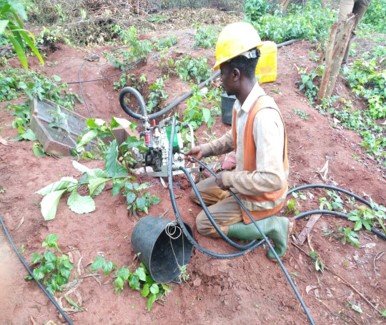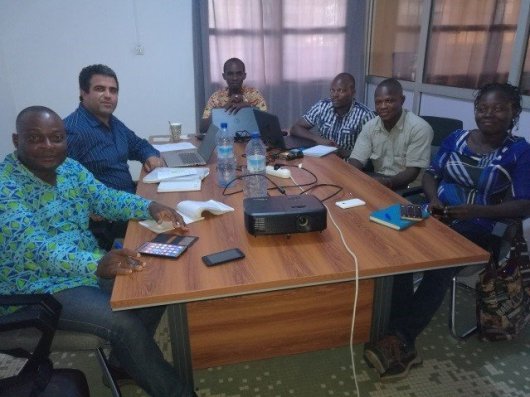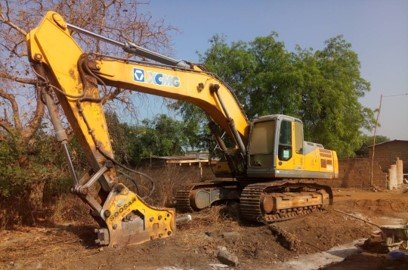
We chose Sofrecom for its independence, technical expertise, reputation for quality workmanship, and experience of working with Huawei on previous projects.
Director, Agence Du Numérique, Benin

Digital Technology at the Heart of Benin’s Transformation
As part of its five-year "Bénin Révélé" project, launched by President Patrice Talon, Benin aims to become the digital services hub for the whole of West Africa by 2021 and to make information and communication technologies the main lever for its socio-economic development.
The Agence pour le Développement du Numérique (ADN), an autonomous executive agency of the Beninese government, supports this ambition with two main objectives: to deploy a very high-speed broadband infrastructure throughout the country and to foster a digital ecosystem that will develop future e-services.
The PDITT Project Is a Large-Scale, Multi-Partner Project
To this end, the Telecommunications and ICT Infrastructure Development Project (PDITT) was launched in December 2016.
|
PDITT in figures :
|
The project objectives are :
- Increase network throughput, availability and reliability. This involves not only renovating the existing network but also deploying a new, modern and scalable infrastructure.
- Significantly improve the quality of service provided to reach the best international standards. This objective is particularly important for operators in neighboring Burkina Faso and Niger, which are landlocked with no access to submarine cables and depend on Benin for their Internet connectivity.
PDITT is designed to enable a wide range of digital uses for businesses and private individuals alike :
- Foster competitiveness for professionals
- Dematerialize administrative processes
- Improve and modernize education and healthcare
The PDITT project requires the provision and installation of :
- DIMS (IP Multimedia Subsystem) network core and 48 IP/MPLS routers
- Over 2,000 km of fiber-optic backbone infrastructure
- More than 250 km of FTTB and FFTH access network
- A metropolitan IP/MPLS network spanning almost 200 km
- 30 LTE-4G mobile radio base stations to complement the existing network
Several key stakeholders are involved in the project :
- Contracting authorities :
- Agence pour le Développement Numérique (ADN), responsible for the deployment of ultra-high-speed broadband infrastructure.
- Benin Telecom Infrastructure (BTI), responsible for marketing to businesses and the general public.
- Benin Telecom Services (BTS), responsible for marketing to businesses and the general public.
- 1 prime contractor: Huawei, the equipment manufacturer selected to supply and deploy the equipment.
At the beginning of the project, not all opinions were aligned as to the technical choices and methodology required: IMS (develop) and FTTx in particular were entirely new subjects for BTI and BTS, who therefore had little in-house expertise. Nevertheless, all parties involved shared the same objective: to deliver a high-quality, ultra-high-speed network as quickly as possible.
Against this backdrop, ADN and Bénin Télécoms called on Sofrecom as a monitoring and control office to support them in this project. Sofrecom's mission includes the following activities :
- Review of project and site planning
- Methodological and technical support on international standards and best practices for network deployment
- End-to-end operational monitoring
- Quality control of civil engineering work, fiber optic installation and equipment deployment
- Provisional acceptance of work
Considering the scale of the investment, Sofrecom's primary objective is to ensure that the infrastructure delivered is of the highest quality and durability, worthy of the world's best networks.
The Project Called on Cutting-Edge Expertise
To achieve this objective, Sofrecom first mobilized a team of some of the most experienced professionals, both in project management — particularly in West Africa — and in the technical fields required (fiber optics, FTTX/Metro, energy and environment, civil engineering, IMS and IP). In all, 9 experts with a total of 195 years of combined experience were involved on a full-time or temporary basis in the project's key positions.
7 engineers employed by Sofrecom's Beninese partner, J&J, have also joined the team; they have gradually strengthened their expertise in project management and team leadership related to the requirements of fiber optic deployment.
The Project Required the Implementation of Strong Governance
The project was divided into several parallel components, with the main ones being backbone, metro, IMS and IPMPLS, FTTx access and environment/energy.
Sofrecom set up a multi-level governance framework :
- A weekly working group for each component to address specific alerts or decisions related to that component of the project
- A weekly operational committee to address operational issues impacting multiple components and make coordinated decisions
- A bi-monthly steering committee with a smaller audience to discuss more strategic issues
- A “quarterly steering committee” to address contract-related matters with the directors of each entity
These various forums for exchange and decision-making have played an essential role in sharing the same information at all hierarchical levels, leading and motivating teams, monitoring actions and, above all, enabling reactive decision-making.
Relying solely on concrete facts observed in the field, Sofrecom was able to objectively make recommendations and issue warnings to rectify situations that could have had a serious impact on the project, without taking sides and always in the interests of quality. As a result, Huawei, BTI, BTS and ADN were able to agree on concerted solutions as quickly as possible.
« Sofrecom gave us the best possible project foll »
Djalil Assouma, Managing Director, BTI
« Facilitating the working groups was a key factor in keeping the teams involved »
Marc André Loko, Director of Broadband and Ultra Broadband Projects, ADN
Quality Guided Technical Choices and Decisions
Objective number 1 was the quality of the infrastructure, which guided the technical choices and ad hoc decisions throughout the project.
From the outset, Sofrecom's various experts reviewed the proposed designs, technical specifications and recommended quantities ("Bill of Quantities") and made recommendations to ensure that these choices matched BTI and BTS's current and future strategies and needs. These recommendations resulted in optimized designs and savings of over 1 million Euros.
International standards were used as references with regard to technical choices.

In a project of this magnitude, employing hundreds of subcontractors who generally have little or no expertise in telecoms and fiber optics, laws are inevitable: trenches are not deep enough for the fiber optics; the concrete quality is unsuitable; the quality of poles for the overhead network is poor, as is the method of compaction or of passing the fiber from room to room; and so on.
« The mission of steering, monitoring and control is fulfilled.»
César Degbé, General Manager of BTSThanks to regular verification planning and the significant presence of Sofrecom, BTI, BTS and Huawei supervisors in the field, problems were quickly identified and corrected in the majority of cases.
In cases of significant flaws, Sofrecom's experts did not hesitate to ]halt the validation of a section despite the resulting delay. They then made recommendations to ensure that the work was resumed according to the expected standards and quality. Methodology and rigor were the guarantors of the final quality of the network.
Sofrecom’s Experts Ensured That the Skills of the BTI and BTS Teams Were Enhanced Throughout the Project
A diversity of profiles : technical expertise + local knowledge
Everyone agrees: the technical expertise of Huawei and Sofrecom experts and the specific knowledge of the field and local practices of BTI and BTS engineers have combined to create a structure that benefits the project and each of its members.
Skills transfer :
Throughout the project, Sofrecom's experts worked to ensure that BTI and BTS engineers, as well as the supervisors of the various worksites, benefited from numerous training courses to acquire the skills specific to the deployment and future operations of a fiber optic network :
- Equipment training at Huawei's facilities in China
- Face-to-face technical training by Sofrecom,
- On-the-job training
All of these training sessions have enabled BTI and BTS engineers to gain in expertise, methodology and autonomy.
« I learned a lot from Sofrecom — how to react, how to manage conflicts, how to write a report. »
Apollinaire Djossou, BTS Project Manager
« Sofrecom enabled us to get to know WDM equipment better by going out into the field with them, seeing how things had to be done, the lists of things to be validated. Afterwards, this enabled us to be more autonomous. »
BTI team leader for supervision of Southern zones

Respect for Indigenous Characteristics and Innate Environment, Combined with Communication Initiatives, Have Reassured the Local Population.
The teams were careful to integrate local cultural and geographical specificities into the project: the rainy season, swampy terrain, the impact of the deployment on the population and respect for Voodoo traditions were all integral parts of the project. Designs and planning were frequently adapted to take these factors into account.
Informing the population to reassure and give meaning to the project
A significant effort was made to communicate with the local population as to the nature, objectives and impact of the work. This facilitated the acceptance of the project by the people of Benin, even though it sometimes called into question age-old traditions. For example, bush fires, a technique used for hunting in certain regions, had to be banned in the areas where the overhead network would pass.
Respect for the environment
Sofrecom initially sought the services of an environmentalist to analyze the impact of the deployments on local populations and make recommendations. The route of certain sections, for example, was modified to minimize the impact on the agricultural lands that were crossed.
In order to minimize the impact of such a deployment, the project's stakeholders wanted PDITT to incorporate environmental protection objectives and for the damage caused by the deployment to be adequately compensated. As a result, more than half of the installed equipment is solar-powered.
In addition, to compensate for damage to forests, 5 trees were replanted for every tree felled. The project also prioritized the reuse of existing conduits for 55% of the 2,500 km deployed to minimize costs, delays and environmental degradation.





